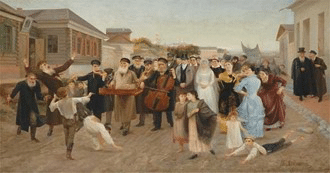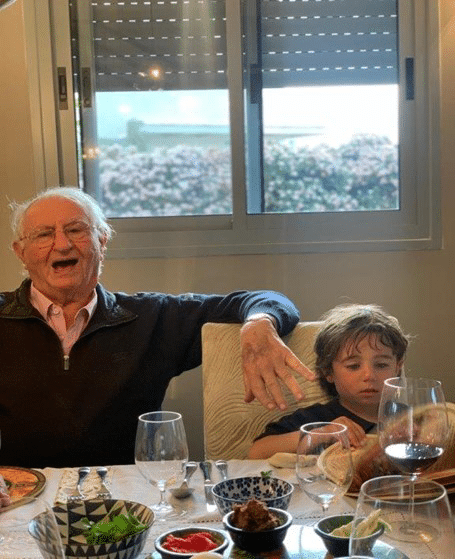It’s a simple question with a complicated answer. A sort of Jewish answer to a typical Jewish question.
There is no clear definition. It may be a particular turn of phrase which creates a special feeling like an unfinished cadence suggesting a lack of resolution, or a warm response on hearing a familiar Jewish tune, in fact, anything with which the Jewish ear and heart feel comfortable.
Music is an art form which affects people differently. So, the more Jewish we feel about ourselves, the more pleasure we will derive from listening to and thinking about the meaning of Jewish music. It is part of our heritage, part of our culture and part of our history.
Our sacred music can be traced back to the days of the First Temple in Jerusalem. King Solomon started building the Temple in 974BC and completed it in 967BC. Augmenting the dedication service was a choir of hundreds with musical accompaniment.
Although we have no knowledge about the music, we do know that King Solomon’s father, King David, was a composer. In addition to playing the harp, he composed many songs of unknown tunes, though we can assume tunes with a decided Jewish feeling and identity.
Following the destruction of the Second Temple in 70CE, choral singing accompanied by instrumental music was banned in the Synagogue as a mark of respect for Jewish suffering.
The dispersal of Jews from the biblical land of Israel to different parts of the world meant that Jewish life revolved around the Synagogue for its survival where singing played an increasingly important role.
Cultural Differences
With the dispersion of the Jews, cultural differences in other countries influenced Jewish composers who were just Jewish by birth and did not often capture the traditional Jewish expression and feeling.
Famous Jewish classical composers like Mendelssohn, Mahler, Halevy, Meyerbeer, Offenbach and Schoenberg all wrote music which cannot be classified as Jewish music. Their works were largely European in structure and formation.
There were exceptions. In 1916 Ernest Bloch composed his Israel Symphony, but is better known for his Avodath Hakodesh written in 1933.
Leonard Bernstein’s oratorio Kaddish premiered in 1963 as a tribute to President Kennedy.
When performed in Tel Aviv it was sung in Hebrew.
Lesser known composer Mario Casteluovo-Tedesco, from an old Jewish family in Florence, composed a version of Lecha Dodi from the Shabbat Service in 1933.
Jewish Folk Songs
If we look around the globe and explore the national music of different countries, they each have their own traditional folk songs.
The sea shanties from sailors in England, Neapolitan folk songs so popular in Italian restaurants, a sad heart-wrenching spiritual from an elderly African-American. All cherished possessions depicting such experiences as happiness, sadness, day-to-day life and so on. What’s more, a wealth of classical music is largely built on the foundation of folk tune melodies to produce a nationalistic flavor.
The earliest knowledge of Jewish folk songs comes between 100BC and 100CE from Yemenite Jews. During the period of their banishment from ancient Israel they maintained an affinity with Jewish spirit with the development of a body of songs which have definite oriental qualities.
Hallelot
Songs based on the Psalms.
Zafat, Chidduyoth, Neshid, Shiroth
All sung during the marriage ceremony and subsequent celebrations.
Exiled Jews in Russia adopted secular folk songs for singing with mournful expression, summing up the hardness of life and demonstrating their plight. Many of the soul-searching melodies from the Jews in Russia formed the basis of modern Israeli folk songs.
In Spain and Northern Africa Ladino folk songs were often sung in secret locations. It helped to keep Jewish life alive at the time of rampant persecution.

The biggest area of Jewish folk songs came from Eastern Europe, particularly from Poland where Yiddish folk songs developed along the lines of the Yemenites with songs for every occasion.
There are Yiddish folk songs for just about everything one can imagine.
Combining these different types of folk songs to create music in modern Israel, we have a fusion of both Western and Eastern music where melodies, written in either polyphonic or monophonic format, come together in a distinctive Middle Eastern genre.
Sacred music has not changed over the centuries.
Traditional Jewish melodies are still chanted in the Orthodox Synagogue and Reform Temple. Classical composers in Israel have opened a new leaf in musical exploration and appreciation with the East meets West syndrome. And folk songs are still at the heart and soul of every Jewish person, wherever they live.
Nothing has changed. Any music which can enhance a strong Jewish feeling with Jews of every persuasion can be classified as Jewish music.

Lloyd Masel made aliyah from Perth, Australia in 1999. He had been active in Zionist Federation programs in Australia, and was the Conductor and soloist of the Perth Hebrew Congregation male choir for 30 years.



